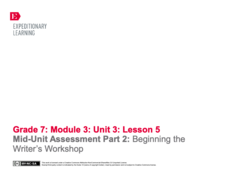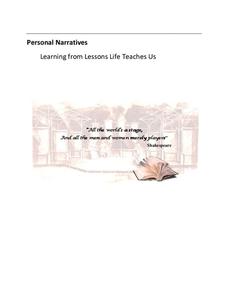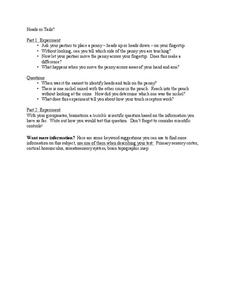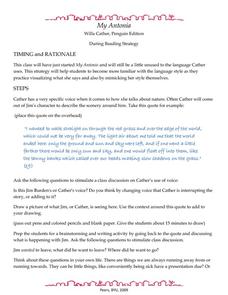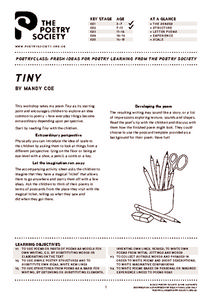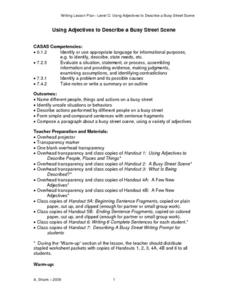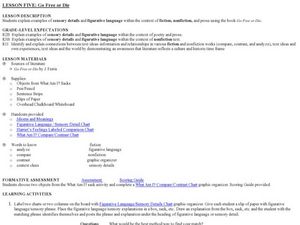EngageNY
Mid-Unit Assessment Part 2: Beginning the Writer’s Workshop
Writers learn about using sensory details as they revise bland sentences with more vivid language. Next, they begin writing the first drafts of their children's books, completing storyboards to effectively plan their writing.
National Wildlife Federation
Sensory Discovery Walk: Connecting With Your Place
Take a blinded tour. Pairs take turns leading each other on a blindfolded exploration of the natural world and take stock of their surroundings using their remaining senses. After the tour, pupils try to map their paths and follow them...
National Wildlife Federation
Sensory Discovery Walk
Let your senses be your lead. Pairs of pupils blindfold their partners and then lead them around nature areas. They use their senses to find landmarks and create maps with their findings. Once they create their maps, they go back to the...
California Education Partners
Covers by Nikki Giovanni
Over three days, scholars listen to and read the poem, "Covers" by Nikki Giovanni. Learners complete a graphic organizer by sketching their visualizations from each stanza then discuss their pictures with a peer. Pupils answer...
Poetry4kids
Evoking the Senses in a Poem
Budding poets choose a topic for a sensory-filled poem. Authors describe that topic using detailed language based on the five senses. Then, switch the senses to create a fanciful poem intended to add a touch of fun to the objective.
Poetry4kids
How to Write an Alliteration Poem
Learners follow five steps to compose an alliteration poem. They choose one consonant and brainstorm as many nouns, verbs, and adjectives they can think of to create rhyming sentences that come together in a poetic fashion.
California Federation of Chaparral Poets, Inc
Poetic Devices
Have everything you need to know about the elements of poetry with a nine-page handout. Split into four categories—word sounds, meanings, arrangement, and imagery—budding poets may reference terms, read definitions, descriptions, and...
Thoughtful Education Press
Personal Narratives: Learning from Lessons Life Teaches Us
"First Appearance," Mark Twain's tale about overcoming stage fright, serves as a model of a personal narrative and gets young writers thinking about milestones in their own lives. After examining student models and considering the...
Roald Dahl
Matilda - The Ghost
How do you think the parrot in "The Ghost" chapter of Matilda feels in the chimney? Put a class member in the hot seat and have the class ask questions relating to how they might have felt if they were the parrot in the chimney. Then,...
University of Minnesota
Heads or Tails
How exactly does touch help us identify items? Students test this question by feeling a coin without moving their fingers and trying to determine if it is heads or tails. They test their accuracy by rubbing their fingers on the coins....
Novelinks
Walk Two Moons: Guided Imagery
Sensory details can enhance the reading experience, especially during a guided imagery reading. Young readers close their eyes and listen to a passage from Sharon Creech's Walk Two Moons before responding to discussion questions and...
Rainforest Alliance
Knowing the Essential Elements of a Habitat
To gain insight into the many different types of habitats, individuals must first get to know their own. Here, scholars explore their school environment, draw a map, compare and contrast their surroundings to larger ones. They then write...
Brigham Young University
Out of the Dust: Guided Imagery
A guided imagery exercise is a great way to get readers thinking about writing. As part of their study of Out of the Dust, Karen Hesse’s 1998 Newbery Medal winning verse novel, class members listen to a reading of one of the poems from...
Leicestershire County Council
Developing Handwriting Skills for Individuals with Autistic Spectrum Disorder
Here is a resource packed with strategies to help individuals with ASD improve their handwriting skills. Intended for the teacher or specialist, the resource provides background information on reasons learners with ASD have difficulty...
Welcome to Ms Bosello's Class!
Alliteration Worksheet
Alliteration and imagery are two vital parts of any well-written poem. Encourage your young poets to include these devices with a set of activities designed to get them thinking, writing, and creating.
Practice Using Lively Language
Practice Using Lively Language
Combine a study of biography writing with some tips for spicing up writing. After reading two passages, one much more descriptive than the other, pupils examine what makes one more interesting. They then brainstorm some ideas for writing...
Curated OER
My Antonia: During Reading Strategy
Home in on the quote on this page to explore setting, the author's and character's voices, and plot in Willa Cather's My Antonia. Pupils draw a picture of what is described in the quote, discuss the content, and make connections to their...
Education Outside
Garden Detective Sensory Tour
To prepare for a sensory walk outside, the whole class engages in a discussion of the five senses, kids close their eyes, and share what they sense. Groups then follow a guide, tour an area, and share what they experience through their...
Poetry Society
Tiny by Mandy Coe
Introduce magic and imagination into your classroom with a poetry activity. Learners read the poem "Tiny" by Mandy Coe and use their magic tickets to visit any place they can think of! The final result is a poem describing where they...
Saint Paul Public Schools
Using Adjectives to Describe a Busy Street Scene
What just happened in the street? After several introductory activities about adjectives and description, pupils use all that they have learned to compose a paragraph about a hectic intersection.
Curated OER
Three Skeleton Key: Elements of Literature
Rats! How are they described in "Three Skeleton Key," and what happens to the characters in the story? Study the vocabulary and the story with these worksheets. Learners complete pre-reading activities, study vocabulary, complete...
Curated OER
Poetry Writing Unit: Writing a Film Poem
Film poems? To concluded a poetry unit, writers select one of their own poems and create a film that brings to life the sounds and images of their work. Included with the detailed unit plan are daily lessons, student examples, a list of...
Curated OER
Go Free or Die: Figurative Language
Figures of speech, sensory details, and academic language are all targeted while reading Chapter Two of J. Ferris’ Go Free or Die. First, learners engage in an exercise to practice describing with detail. Then, partners use a chart to...
Curated OER
Go Free or Die
Groups of older elementary learners begin their study of figurative language by visiting a website and completing the exercises detailed there. They then apply what they have learned by finding examples in several poems. Finally, they...


